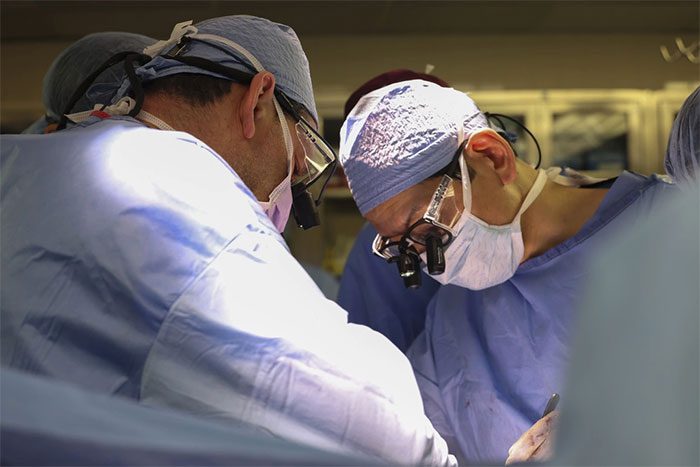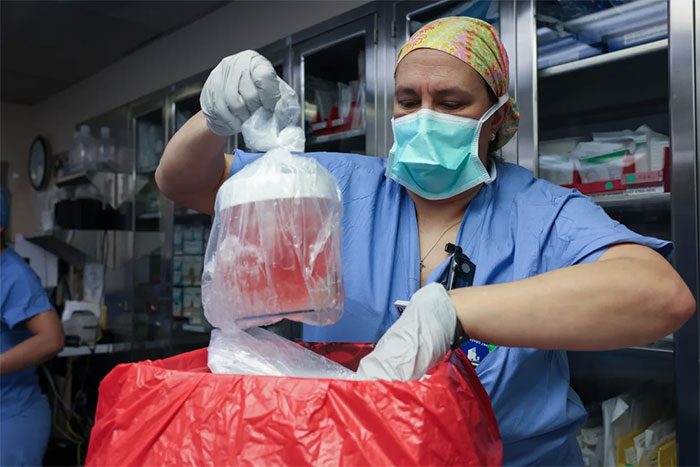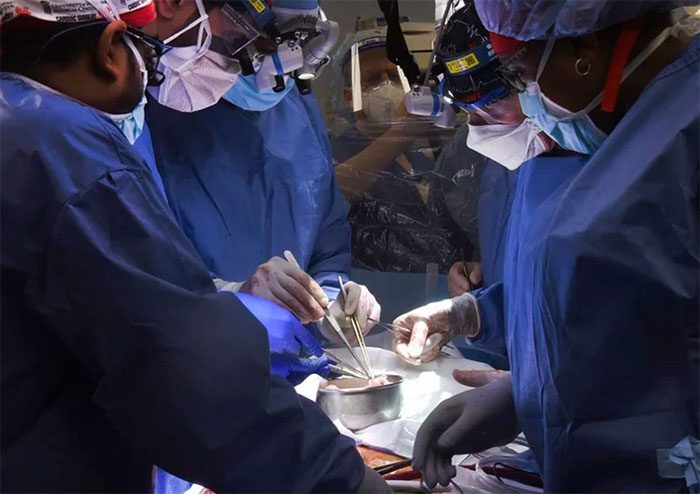Doctors at Massachusetts General Hospital (USA) have successfully performed the first kidney transplant from a pig into a living patient.
According to a statement released on March 21, doctors at Massachusetts General Hospital (USA) have successfully carried out a pig kidney transplant into a living patient.
The surgery took place on March 16 and lasted for four hours. According to a statement from the hospital, the 62-year-old patient, named Richard Slayman, is in good condition and is expected to be discharged following recovery.
A Last Resort Next to “Death”
The transplantation of a pig kidney into a human body occurred in Richard Slayman’s case because he had no other options left.
It is known that Richard Slayman has a history of type 2 diabetes and high blood pressure and had been on dialysis for seven years before undergoing a human kidney transplant in 2018.

Surgeons at Massachusetts General Hospital performing surgery on a genetically modified pig kidney transplanted into a living patient. (Photo: AP).
However, five years later, the transplanted organ showed signs of dysfunction, leading Slayman to restart dialysis in 2023.
This resulted in severe complications, and Slayman frequently had to visit the hospital for treatment.
Dr. Winfred Williams, the deputy chief of the nephrology department at Mass General and the patient’s primary physician, stated that Richard Slayman might have to wait 5 to 6 years to receive a human kidney.
“He won’t survive until then,” Dr. Williams emphasized.
Opportunity arose for Slayman when he was contacted by Massachusetts General Hospital to undergo the first pig kidney transplant in a living human.
The kidney used was from a genetically modified pig, provided by egeneesis, a biotechnology company. egeneesis utilized the CRISPR gene-editing system to modify the pig’s genes, making them compatible with the human body.
If the surgery is successful, it will mark a significant breakthrough in addressing one of the most pressing issues in the modern world: the shortage of organs for transplantation in humans.

A nurse takes the pig kidney out of the box to prepare for transplantation. (Photo: AP).
A Turning Point for Humanity and “The Opportunity to Live” from Animal Organs
For decades, scientists have worked diligently to enable organs from genetically modified animals to function in the human body without being rejected.
This is due to the extremely limited supply of functioning organs like hearts, kidneys, and livers from both living and deceased human donors.
However, when it comes to transplanting parts that do not “belong” to humans, such as hearts, kidneys, and stomachs, another challenge arises: the inevitable rejection process.
Specifically, just a few hours after transplantation, even with immunosuppressive drugs in use, what is known as the “super-rejection system” occurs, leading to transplant failure and patient death.
Several experiments have been conducted in recent years, including the transplantation of a pig kidney into a brain-dead patient in 2021 and two pig kidneys for another brain-dead patient in 2022.
Also in 2022, a 57-year-old man underwent the first pig heart transplant but died 61 days later.

Scientists performed 69 modifications on the DNA of pigs before transplantation into humans.
This outcome indicates that despite significant investments in research and remarkable advancements in technology and modern medicine, these methods have yet to become viable for sustaining life and organ function.
As a result, scientists can only rely on experiments involving brain-dead patients or voluntary organ donations, treating them as “tests” before they can be recognized as a viable medical therapy.
In this case, to create organs compatible with humans, scientists removed three genes related to the production of carbohydrates or sugars found in pigs that the human immune system would attack.
Additionally, they added seven human genes to help prevent immune-related domino effects that could lead to organ rejection.
Lastly, they inactivated segments of DNA from a virus – known as endogenous retroviruses – in the pig’s genome. According to egeneesis, these do not cause problems for pigs but could harm the human body.
In total, the scientists made 69 modifications to the pig’s DNA before harvesting its kidney for human transplantation.
As part of the transplant process, Slayman received two antibody-based treatments to help prevent organ rejection, as well as immunosuppressive medication.
Currently, Slayman’s health is being closely monitored to detect any abnormalities related to the rejection of the new organ.
If this kidney transplant is successful, it will open up opportunities for millions of people worldwide.
It is estimated that nearly 70,000 kidney transplants, over 20,000 liver transplants, about 5,400 heart transplants, 3,400 lung transplants, and 2,400 pancreas transplants occur each year globally.
In the United States alone, there are still over 100,000 people on the organ transplant waiting list, suffering from severe symptoms and side effects.
Approximately 6,000 of these individuals die each year while waiting hopelessly for a kidney, heart, or lung from a deceased person.



















































